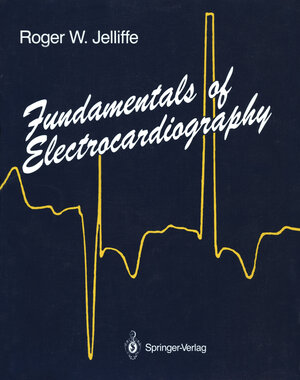
×
![Buchcover ISBN 9780387971858]()
Fundamentals of Electrocardiography
von Roger W. JelliffeInhaltsverzeichnis
- One: Normal Things.
- An Initial View of the EKG.
- Definitions of Q, R, S, T, and U Waves.
- Calculating the Heart Rate and Other EKG Events.
- How to Approach an EKG.
- Electrical Activity of Myocardial Cells.
- How Single Cell Events Generate the EKG.
- Events During Depolarization and Repolarization.
- Influence of Direction of Positive Voltage on the Recorded Signal.
- Lead Systems: Limb Leads.
- Plotting the Frontal Plane Axes: The Method of Semicircles or Hemispheres.
- Normal Ranges: Frontal Plane Axes.
- Lead Systems: Precordial Leads.
- Plotting the Horizontal Plane Axes: Their Normal Ranges.
- The Cube Vector System Leads.
- The Pathway of Ventricular Depolarization.
- Two: Hypertrophy, Strain, Ischemia, and Injury.
- The Normal P Vector or Axis, and Atrial Enlargement.
- Intracellular EKG Changes with Strain, Ischemia, Hypertrophy, and Infarction.
- Ventricular Hypertrophy and Atrophy.
- Right Ventricular Hypertrophy (RVH).
- Left Ventricular Hypertrophy (LVH).
- Three: Intraventricular Conduction Defects.
- Left Bundle Branch Block (LBBB).
- Right Bundle Branch Block (RBBB).
- The Hemiblocks.
- Wolff-Parkinson-White Syndrome.
- The Lown-Ganong-Levine Syndrome.
- Electrical Alternans and Aberrant Intra-Ventricular Conduction.
- Four: The Infarcts.
- Myocardial Infarction.
- Ischemia, Injury, and EKG Evolution Following Infarction.
- Anteroseptal Myocardial Infarction.
- Apical or Lateral Myocardial Infarction.
- Inferior or Diaphragmatic Myocardial Infarction.
- Posterior Myocardial Infarction.
- Infarction and Bundle Branch Blocks.
- Pericarditis and/or Effusion.
- Five: Extrasystoles.
- Normal Sinus Rhythm and Its Variations (NSR).
- Sinus Bradycardia.
- Sinus Arrhythmia.
- The Paradoxical Pulse.
- Wandering Atrial Pacemaker.
- Sinus Tachycardia.
- Sinus Standstill or SA Block.
- Extrasystoles: General Aspects.
- Atrial Extrasystoles.
- AV Nodal (Junctional) Extrasystoles.
- Ventricular (Purkinje Cell) Extrasystoles.
- Treatment of Extrasystoles.
- Ventricular Extrasystoles due to Automaticity or Re-Entry.
- Six: The Ectopic Arrhythmias.
- Analysis of Ectopic Tachycardias.
- Vagal Maneuvers.
- Atrial Tachycardia.
- Junctional Rhythm or Tachycardia.
- Atrial Flutter.
- Atrial Fibrillation.
- Treatment of Atrial, Fibrillation.
- AV Dissociation by Interference (Accelerated Idioventricular Rhythm).
- Ventricular Tachycardia.
- Treatment of Ventricular Tachycardia.
- Ventricular Fibrillation.
- Seven: Conduction Disturbances.
- Disturbances of AV Conduction.
- First Degree AV Block.
- Second Degree AV Block and the Wenckebach Phenomenon.
- Mobitz Types 1 and 2 Second Degree AV Block.
- Third Degree or Complete AV Block.
- Stokes-Adams Episodes.
- Eight: Pulmonary Disease and Pediatric Tracings.
- Pulmonary Disease.
- Pediatric Tracings.
- Nine: Drugs, Electrolytes, Pacemakers, and Technical Errors.
- Digitalis.
- Pacemakers.
- Technical Errors.
- Primary Secondary and Nonspecific T Wave Changes.
- T Wave Changes due to Digitalis.
- Electrolyte Changes.
- Conclusion.
- References.



